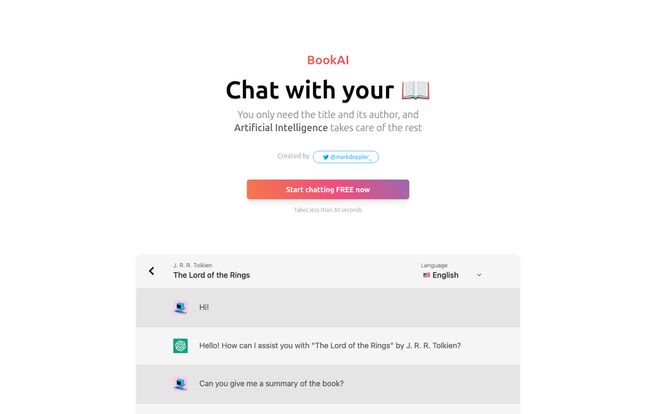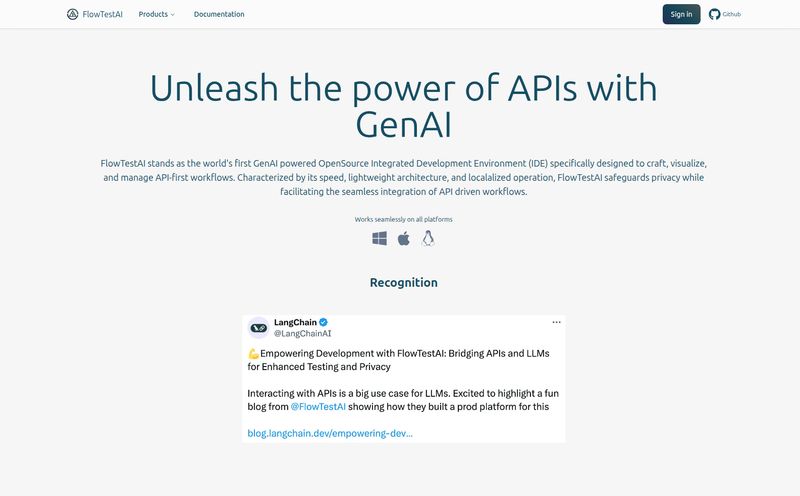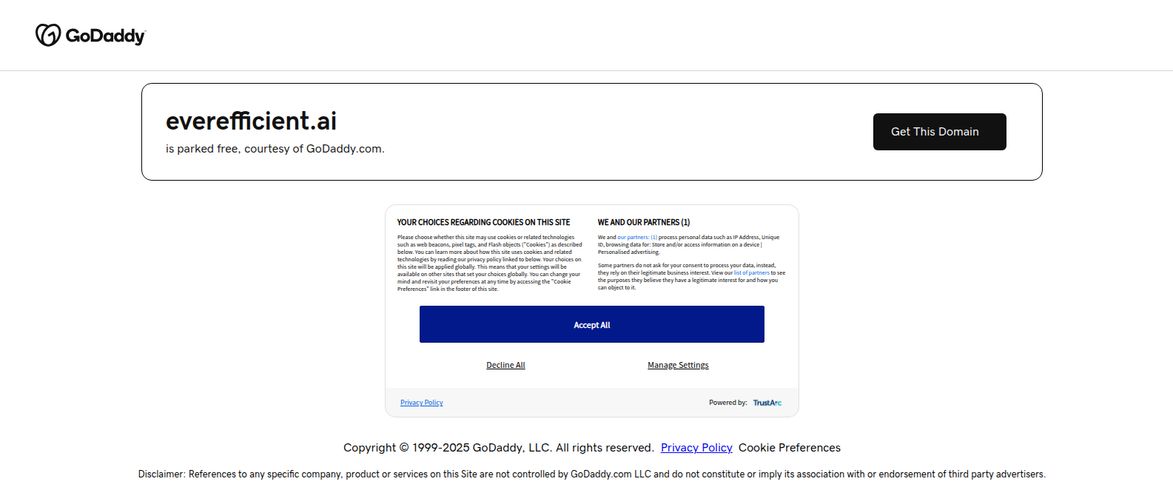I’ve been in the SEO and digital trends space for years, and I’ve seen it all. Or so I thought. I’ve seen AI write code, create stunning art, and even try to convince a Google engineer it was sentient. But I’ve never seen an AI that lets you have a full-blown conversation with a book. Not an author. The book itself.
Sounds like something out of a sci-fi novel, right? Maybe a bit like the monster in Frankenstein, cobbled together from disparate parts to create a thinking being. I was skeptical, to say the least. But then I stumbled upon BookAI.chat, and my curiosity got the better of me. So I spent an afternoon throwing every question I could think of at my favorite novels. The results were… well, they were fascinating.
So, What on Earth is BookAI.chat?
Let's get the technical stuff out of the way. BookAI.chat is a web tool that uses powerful AI models—specifically GPT-3 and the mighty GPT-4—to create a conversational interface for virtually any book. You just type in the title and author, and a chat window pops up. It’s essentially a chatbot, but instead of being programmed with customer service scripts, its entire “personality” and knowledge base is the book you’ve chosen.
It's less like a simple Q&A bot and more like having a direct line to the book's soul. A friendly ghost in the machine, ready to discuss plot points, character motivations, or even just give you a quick summary if you’ve forgotten what happened in chapter three. The idea is simple, but the execution is what makes it so compelling.

Visit BookAI.chat
My First Conversation: A Chat with Middle-earth
To kick things off, I went with a classic: The Lord of the Rings by J.R.R. Tolkien. The interface is clean and ridiculously easy. I typed in the title, and boom, there it was. Ready to chat.
I started with a softball, just like the one in their demo: "Can you give me a summary of the book?"
Certainly! 'The Lord of the Rings' is an epic high-fantasy novel that follows the journey of a hobbit named Frodo Baggins as he and the Fellowship of the Ring embark on a quest to destroy the One Ring...
Okay, standard stuff. It nailed the summary. Competent, but not mind-blowing. It's the kind of thing you could get from Wikipedia. But then I pushed it. I asked something a bit more interpretive, a question that has fueled fan debates for decades: “What do you think was Gandalf’s biggest fear?”
The response wasn't just a factual recall. It synthesized information from across the entire tome, discussing Gandalf's confrontation with the Balrog, his refusal of the Ring, and his constant worry about Sauron's influence and the weakness of Men. It talked about his fear of failure and the burden of his task. It felt… insightful. Like I was talking to a true scholar of Middle-earth. I was hooked.
The Good, The Bad, and The... AI-y
No tool is perfect, especially in the wild west of generative AI. After chatting with a half-dozen books from George Orwell's 1984 to a surprisingly articulate Pride and Prejudice, I got a pretty good feel for its strengths and weaknesses.
The Good Stuff
The sheer engagement factor is off the charts. It's just plain fun. It transforms the passive act of reading into an active dialogue. I found myself thinking about books in new ways, purely because I could now "ask" them questions. Another huge plus is the multi-language support. With over 30 languages, you could theoretically discuss Proust in the original French or learn Spanish by quizzing Don Quixote. For language learners, that's an incredible feature.
Where It Gets a Little Fuzzy
Now for the reality check. The tool’s greatest strength—its reliance on AI—is also its biggest liability. The answers are only as good as the AI's understanding of the text. For wildly popular books like The Hobbit, the knowledge base is rock-solid. But for a more obscure text? You might get some odd answers or even AI “hallucinations.” Always trust, but verify. This is a study buddy, not an infallible oracle.
Also, it's pretty useless for highly visual books. I tried to ask it about the art style in a graphic novel, and it was completely lost. It processes text, not images, so keep that in mind. It's for the words, not the pictures. There's also the ever-present issue of AI bias. The model reflects the data it was trained on, so it’s possible for certain interpretations to carry subtle biases. It’s not something I overtly noticed, but it’s a good thing to be aware of with any AI tool.
Who is This Tool Really For?
I can see a few groups getting a massive amount of value from this.
- Students: Oh man, I wish I had this in college. Need to quickly understand the main themes of Moby Dick before a test? Need a list of examples of foreshadowing in Macbeth? This is your new best friend. It’s like having interactive CliffsNotes on demand.
- Book Club Members: Running late for your book club and only halfway through this month's pick? A five-minute chat with BookAI can give you all the talking points you need to sound brilliant. You're welcome.
- Curious Readers: Ever finish a book and just have... questions? This is for you. It satisfies that intellectual curiosity that used to be relegated to late-night forum dives on Reddit.
Let's Talk Money: The Price of Conversation
This is where things get a bit mysterious. The homepage proudly exclaims "Start chatting FREE NOW," which is great. I love free. However, when I tried to find a dedicated pricing page for subscription tiers or limitations, I hit a 404 error page. A dead end.
My guess? BookAI.chat is likely still in a growth or beta phase, focusing on user acquisition before rolling out a concrete pricing plan. It might end up as a freemium model—a certain number of chats for free, then a subscription for heavy users. My advice: get in now while it’s clearly open and free to use.
BookAI vs. Just Googling It
Some might argue, "Why not just Google it?" It's a fair question. You can find summaries and analyses all over the internet. But that misses the point. The magic here isn't just getting information; it's the interaction. With a Google search, you get a list of links. With BookAI, you get a conversation. You can ask follow-ups. You can say, "Explain that in a simpler way," or "What's another example of that?" It's a dynamic, flowing dialogue that a static search results page can never replicate.
Frequently Asked Questions
- Is BookAI.chat really free to use?
- As of right now, yes! You can start chatting with books for free. A formal pricing structure isn't public yet, so this could change in the future.
- How accurate are the AI's answers?
- For popular books, it's impressively accurate. However, it's still an AI and can make mistakes or "hallucinate" facts for more obscure works. It's best used as a guide, not an absolute source of truth for academic citations.
- Can I chat with any book in existence?
- Theoretically, yes. As long as the AI has access to the book's text in its vast training data, you can chat with it. It works best with well-known literature that is widely available online.
- What languages does BookAI support?
- It supports over 30 languages, making it a fantastic tool for both native speakers around the world and for people looking to practice a new language with a familiar story.
- Does the AI understand literary devices like themes and symbolism?
- Yes, and this is one of its most impressive features. You can ask it to identify themes, explain a metaphor, or track a symbol's meaning throughout the narrative, and it does a surprisingly good job.
Final Thoughts: A New Chapter in Reading?
I came in a skeptic and I'm walking away a convert. BookAI.chat isn't going to replace the beautiful, personal experience of actually reading a book. Not at all. But that's not its goal.
What it does is create an entirely new layer of interaction with the stories we love. It’s a study partner, a debate opponent, and a wellspring of trivia, all rolled into one. It’s a tool that leverages the awesome power of modern AI not to replace human creativity, but to celebrate and explore it in a new way. It's a bit strange, a little imperfect, and absolutely worth your time.
Give it a shot. Pick your favorite book, and ask it that one question you've always wanted answered.



